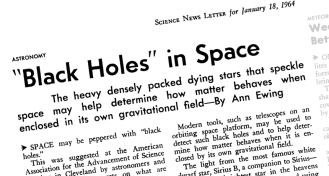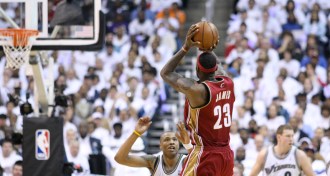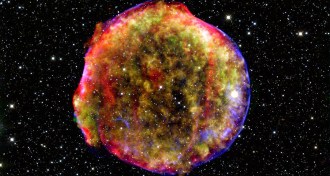
Tom Siegfried is a contributing correspondent. He was editor in chief of Science News from 2007 to 2012, and he was the managing editor from 2014 to 2017. He is the author of the blog Context. In addition to Science News, his work has appeared in Science, Nature, Astronomy, New Scientist and Smithsonian. Previously he was the science editor of The Dallas Morning News. He is the author of four books: The Bit and the Pendulum (Wiley, 2000); Strange Matters (National Academy of Sciences’ Joseph Henry Press, 2002); A Beautiful Math (2006, Joseph Henry Press); and The Number of the Heavens (Harvard University Press, 2019). Tom was born in Lakewood, Ohio, and grew up in nearby Avon. He earned an undergraduate degree from Texas Christian University with majors in journalism, chemistry and history, and has a master of arts with a major in journalism and a minor in physics from the University of Texas at Austin. His awards include the American Geophysical Union's Robert C. Cowen Award for Sustained Achievement in Science Journalism, the Science-in Society award from the National Association of Science Writers, the American Association for the Advancement of Science-Westinghouse Award, the American Chemical Society’s James T. Grady-James H. Stack Award for Interpreting Chemistry for the Public, and the American Institute of Physics Science Communication Award.

Trustworthy journalism comes at a price.
Scientists and journalists share a core belief in questioning, observing and verifying to reach the truth. Science News reports on crucial research and discovery across science disciplines. We need your financial support to make it happen – every contribution makes a difference.
All Stories by Tom Siegfried
-
 Science & Society
Science & Society50 years later, it’s hard to say who named black holes
In 1964, Science News Letter was the first publication to print the term black hole, but nobody is really sure who used the term first.
-
 Cosmology
CosmologyCosmic inflation has its flaws, but so do its critics
Philosophical predispositions color efforts to debunk a popular theory about the evolution of the universe.
-
 Math
MathRise of Big Data underscores need for theory
Big Data can help scientists cope with complex systems, but only with an appreciation of its limits and recognition of the need for theoretical modeling.
-
 Math
MathWhy Big Data is bad for science
Big Data is supposed to be a scientific bonanza, but it challenges the capabilities of computer science, statistical tests and perhaps calls for revamping the scientific method itself.
-
 Cosmology
CosmologyFor proposals that challenge paradigms, peruse arXiv.org
The online physics archive offers crazy ideas to confront cosmological challenges.
-
 Science & Society
Science & SocietyTop 10 revolutionary scientific theories
Quantum theory, game theory and evolution all make the list of history’s paradigm-busting revolutionary scientific theories.
-
 Science & Society
Science & SocietyReplacing paradigms requires open minds
Cosmological crises require creativity, but science enforces conformity.
-
 Math
MathScientists who claim ‘hot hand’ is a myth have never had one
The “hot hand” in basketball is more than a lucky streak or defiance of statistical chance.
-
 Physics
PhysicsTop 10 scientific supers
From supersonic to supernova, superego and supersymmetry, a roundup of science’s super superlatives.
-
 Particle Physics
Particle PhysicsHiggs mass isn’t natural, but maybe it shouldn’t be
Famous particle’s perplexing properties suggest physicists should change their expectations.
-
 Physics
PhysicsIt’s too soon to declare supersymmetry a tragedy
Supersymmetry is the odds-on favorite to solve many of the mysteries about the physical world that have stumped theorists for decades. Supposedly the LHC should produce actual evidence for SUSY, but it hasn’t. And so some physicists have begun to declare SUSY dead, or at least on life-support.
-
